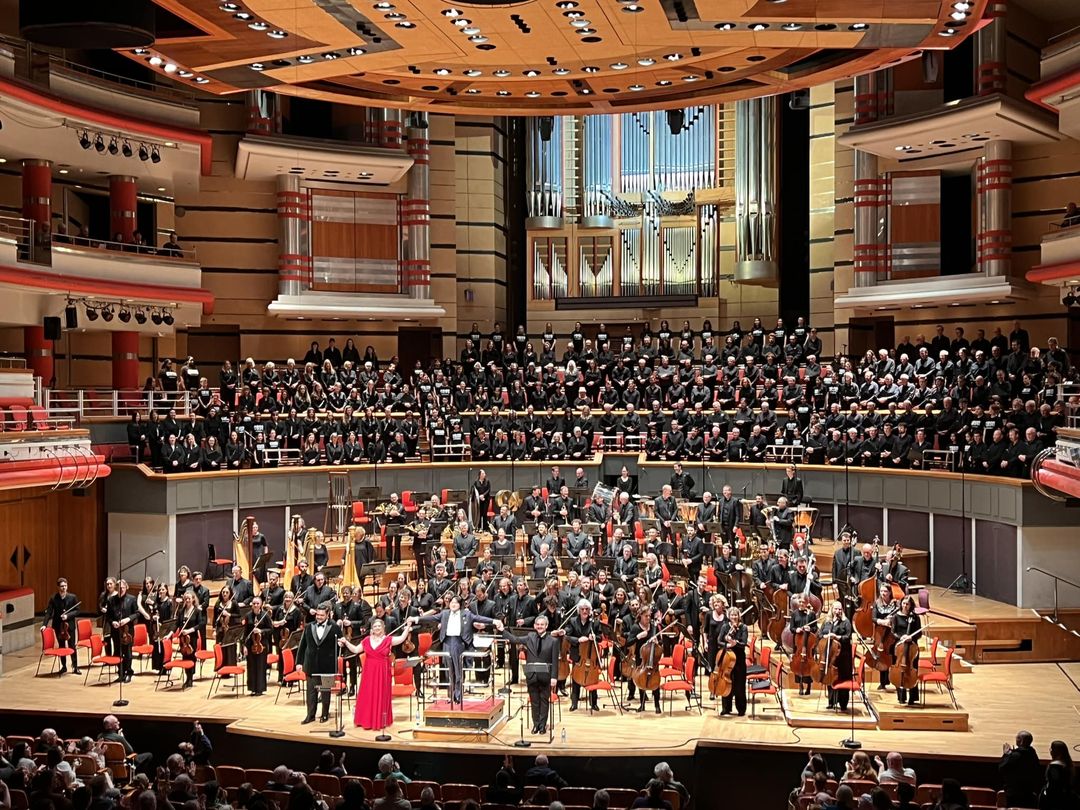Worse than Most? He never was
NewsMy monthly essay in The Critic examines the early struggles of a world conductor.
The ugliest epithet ever attached to a conductor in my time was coined in the late 1980s when two London orchestras were fighting it out for the right to sole residency at the Royal Festival Hall. Neither organisation was in good shape.
The Philharmonia Orchestra was conducted by Giuseppe Sinopoli, an Italian psychoanalyst whose ideas floated above the players’ heads. The London Philharmonic was losing the inspirational Klaus Tennstedt to cancer and players were unsure about his successor, a bespectacled Austrian, not yet 30, who went by the assumed name of Franz Welser-Möst.
Two backbench musicians duly dubbed him Frankly Worse than Most, an insult aimed not just at the man but the entire maestro breed. All conductors, the tag implied, were rubbish. This one was just WTM….
Read on here (and subscribe).







Yuja dresses like a cheap hooker.
There, it’s been said.
Nothing against cheap hookers, they provide a time-honored, valuable, relational services for the indigent, since Biblical times.
So now Franz Welser-Most is being accused of being Yuja Wang?
NL wrote of “how unpleasant classical music can be.” Indeed.
Unpleasant classical music. Yes. Toxic London orchestras. It was ever thus.
have provided
Thank you.
Wrong page, dude.
I think you meant to post on the story about Yuja and John Eliot Gardiner and the mystery mediator flying in for some mysterious contre-temps.
Nonetheless, 22 thumbs up for this comment!
Just goes to show the depth of feelings inspired by Yuja, even on a story completely not about her.
So many women do now, alas. Raunch culture is popular with women, as ‘tatts’ are for men, but lest males get the wrong idea; it’s all for show. Women don’t mean for you to touch them!!
Some misogynists can’t even post in the right place, so blinded are they by spite.
Some misogynists are so blinded by incel spite, they can’t even find the right place to post their bile.
Obviously posting in the wrong place and with a all too typical male attitude.
I had a conversation once with a member of the Cleveland Orchestra, and he said that one of the challenges playing for FWM is that he doesn’t make it clear what he wants, he reacts only to what he doesn’t like. Or in other words, “leadership from behind.” It does summarize the infrequent experiences I’ve had hearing the Cleveland Orchestra live. They’re an excellent orchestra, but I can’t say I’ve heard a revelatory performance of anything from them and FWM. At their best, just very competent performances of a number of works that haven’t stayed with me. I have a difficult time imagining anyone wanting to purchase a FWM “box set” of his recordings if it ever exists the way I have for other conductors like Karajan, Giulini, etc. FWM is competent but seems without a conducting personality in the mainstream orchestral repertoire. Generic competence.
I completely agree with every one of your impressions. Technically brilliant and careful with orchestral balances does not, alone, make one an interesting conductor.
Technically brilliant? He had to start the last movement of Berg Kammerkonzert THREE times.
Nobody buys any Maazel, Mehta, Järvi or Jansons either!
Very true. I only buy cds where the conductor is a legend. Walter. Karajan etc.
Nothing quite like the unfocused, flatulent sound of the BPO under Karajan.
I am not a fan. I can’t say I have been happy when I have seen in the program of the season, and agree with the Cleveland colleague: he does not seem to know what he wants many times, and after the concert with him I never have felt “wow, that was a very good concert”.
The Tristan performances of a few years back were spectacular as were the performances of The Cunning Little Vixen. I think the orchestra rises to great heights when they perform opera. I recall that they took Rusalka to Salzburg awhile back which brought great envy from the Viennese.
I agree. In 2005, I was offered a job at Kent State University. One of the temptations was that the Cleveland Orchestra was less than an hour away. I saw some very satisfactory concerts there, but spine-tingling was conspicuous by its absence.
FWM’s misfortune, like that of many of his generation, was the implosion of the recording industry. When he got to Cleveland, long gone were the days of recording with Telarc for example, which Maazel and Dohnanyi clearly benefited from. He is the razzle-dazzle personality that the Dude is, to be sure. But I still vividly remember that knockout performance of Franz Schmidt’s The Book with seven Seals they did in Cleveland that kept me hoping he’s do more from that composer; he hasn’t…yet.
Thanks for sharing your “infrequent” experiences. I have a higher opinion of him, but perhaps that comes of hearing him more than infrequently.
It seems reasonable that a conductor would want to hear what an orchestra is giving him before making comments. Some orchestra members (not Cleveland) have made known their suspicions of conductors who give comments before they’ve played a note – almost as if he has a list to go through no matter what an orchestra does. Welser-Most’s videos of Cleveland/Bruckner and the Brahms German Requiem are revelatory, in my book at least.
The Cleveland Orchestra sounds fabulous under certain guest conductors I’ve seen and heard there.
FW-M, not so much …
==“leadership from behind.”
David Atherton, the UK conductor was like this. He’d rehearse a Sibelius symphony with BBC SO by just going through it, with players occasionally interjecting “Maestro, is there anything you want ?” when all they were hearing was what the maestro didn’t want.
Sometimes I wonder if conductors realize that this is how they work. Orchestras can get tired of a diet of negative comments only.
Over the years I’ve learned that the highest compliment I can expect from a conductor is for them not to talk to me all week. The less they said, the better they liked it.
I remember with my orchestra some years ago, our conductor, who also worked this way, trying to be supportive of a player, — it was a little awkward because he didn’t really know how to be helpful, — said “X, are you comfortable on your solo?”
X replied, “What was wrong with it?”
Conductor: “Nothing, nothing! I was just –”
X: “Well there must have been something you didn’t like, or you wouldn’t have brought it up. What do you want different?”
(I should say, X and the conductor had a bit of history — wherein the conductor freely showed his displeasure in a rehearsal or concert any time X made a mistake, which affected X’s confidence, leading to more mistakes, leading to the conductor giving cues with an “oh boy, I’m not optimistic about this” expression on his face. So by the time X said that, it was well justified in my opinion.)
I am not objective on the subject but I don’t think the Cleveland Orchestra has presented a concert of this quality in 50 years. Unfortunately, the Mozart 40th isn’t included. After the Beethoven Szell’s comment was reported to be “now that’s a performance”.
https://www.youtube.com/watch?v=VGjF5mWYnHo
“Carlos Kleiber, the all-time maestros’ maestro, used to flutter around for a minute or more before exhaling. […] Silence may well be the true secret of great conducting.”
It depends on the circumstances. I experienced Kleiber start La Boheme, act I, in the middle of loud bravos (the bravos were louder than the applause, of course).
. . . and Kleiber has left a discography of well less than 50 works total. Most anybody professional can be great at a small number of works. Where’s Kleiber’s Mahler 3? . . . oh, sorry, there isn’t one. I have a pirate of a live performance with FWM and Cleveland that’s excellent.. Bruckner? . . . . Nope. None of that either.
Until the late 60s Kleiber’s repertoire was much larger than his discography suggests. The quality of his recordings and his performances has never been in question.
Overall, however, his legacy pales in comparison to, say, his contemporary Claudio Abbado, who left his mark not only with the orchestras and opera houses he closely worked with, but also with more than a generation of musicians he mentored in his extensive work with youth orchestras.
There’s actually a very easy way to tell. Have someone perform a blind test of recordings of the exact same piece including some of the biggest names: Karajan, Giulini, etc. Include as part of your sample a recording by Mr. Welser-Möst, and thrown in there a few additional recordings by some much lesser known conductors. Try to keep your sample to reputable orchestras of comparable caliber (although you’d be surprised how well many orchestras not of international rank actually play). Then, identify each recording merely with a number and rank them in order of preference. This exercise might prove to be rather challenging and show that, except for a few exceptions that pop out at best once or twice in a generation, it is often very difficult to tell the difference between conductors when one is merely listening as opposed to looking — and listening is the only thing that should matter. For the most part — there are indeed rare exceptions — the conductor’s role is one of sheer mystique which provides, for some audiences, an opportunity for fulfilling the insatiable human need for sycophancy. The latter actually also applies to many orchestra musicians, who see in the conductor an authority figure able to regulate the infantilism that unavoidably derives from having one’s life-experience essentially summed up by decades being spent alone in a practice room perfecting orchestral excerpts. Paradoxically, this figure also provides an occasion for orchestra musicians to find some sort of personal validation by expressing their musical expertise and debating finer, minute points which musically make almost no difference. There can indeed be an osmosis between orchestras and their conductors. But this happens incredibly rarely, because that would imply the conductor to have something significant to say, which is incredibly unlikely in a time dominated by image, hype, and impervious to anything other than cookie-cutter, risk-averse, predictable and highly marketable music-making.
I have long wished for just such a practice of blind reviewing. Even if reviewers were brave enough to practice it, though, it might be impractical for various reasons.
Many years ago one of the English hi-fi & music magazines, I forget which, did such blind comparisons for a few works for a relatively short time. One test sticks in my head, which was of the Planets where a generally ignored recording was, to the surprise of the reviewers, picked as #1 – LPO under Haitink.
I think that there is a reluctance to do blind testing and comparison for fear that it would expose many of the reviewers. In the realm of stereo equipment, the results of blind testing, particularly wrt connectors, cables, etc. were so divergent from orthodoxy – and price! – that articles were written explaining why blind reviewing was actually not a fair test.
And of course, in classical music, the spectre of Joyce Hatto hangs delightfully over the know-it-alls.
Great Article, Norman!
“…Cleveland … a rustbelt city of staggering deprivation”
Now, now, NL, play nice.
NL’s description is more suited to the Cleveland of 1969-1995 than of 2021. Of course, COVID has hit the area hard but that’s true of any city in the USA. But the recent improvements downtown, along the mid-town corridor, and in University Circle (where Severance Hall is located) would be startling to anyone. And it’s not as if the river is still catching fire like it did 50 years ago. Indeed, it’s a popular kayaking spot now.
As for FWM, I find his conducting very uneven. He tends to rush tempos. But there are just as many who interminably drag them. As for the comment that “he doesn’t know what he wants”, I’ve attended rehearsals where he was exacting in his demands and worked with the orchestra until he got what he wanted. He knows exactly what he wants, but it may not be to all tastes.
Whether “worse than most” or not, Welser–Möst has never been an interesting conductor or a probing musician.
In the CD, “A New Century”, with FWM and the Cleveland, I hear a return to the glory years of the CO when they were perhaps the best in the world.
There’s an interview online with FWM from 2021 done at the Cleveland Clinic. Personally I think he came across as a bit arrogant, but so do others. He informs how he convinced the powers that be in Cleveland to hire him as music director. In fairness, both Dohnanyi and Maazel were appointed with having very little history with the CO. Both had their short comings to be sure—even Szell gave some ho-hum concerts. There have been some successes no doubt, but I generally avoid FWM performances and recordings. The recent crop from the CO’s own label have garnished some positive reviews, but I don’t find them memorable.
https://www.youtube.com/watch?v=JmQxI3EzPEU
Cleveland under Szell was the musical equivalent of Nottingham Forest under Brian Clough. And an almost impossible act to follow even decades later.